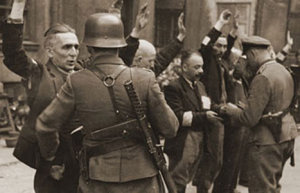Neighborhood Safety Ghettoes in D.C.
So, there’s this poster that’s been circulating around anarchist, civil libertarian, and lefty blogs for a few months now. It’s become popular because it’s funny (in a nerdy way), and also because it makes an important point:
But, well, the awful truth is that, as with so many other things in American politics, the answer to that rhetorical question can’t really be taken for granted, because it really depends on what kind of neighborhood you live in. The poster makes an important point addressed to, and about the daily lives of, people of a particular socioeconomic class (specifically, the people who most often spend their time reading blogs). For many if not most people in other social classes, the answer really is just, You bet it will.
Or, It already is. Has been for decades. Where you been?
For example, consider the cops plans for improving neighborhood safety
in the D.C. Ghetto. No, I’m not using that last word as a careless synonym for slum.
I am using it in the most literal sense.


D.C. police will seal off entire neighborhoods, set up checkpoints and kick out strangers under a new program that D.C. officials hope will help them rescue the city from its out-of-control violence.
Under an executive order expected to be announced today, police Chief Cathy L. Lanier will have the authority to designate
Neighborhood Safety Zones.At least six officers will man cordons around those zones and demand identification from people coming in and out of them. Anyone who doesn't live there, work there or havelegitimate reasonto be there will be sent away or face arrest, documents obtained by The Examiner show.
Guess who decides what counts as a legitimate reason
for being in the neighborhood — the people who live and work in that neighborhood, or the government’s goon squad?
Lanier has been struggling to reverse D.C.'s spiraling crime rate but has been forced by public outcry to scale back several initiatives including her
All Hands on Deckweekends and plans for warrantless, door-to-door searches for drugs and guns.Under today's proposal, the no-go zones will last up to 10 days, according to internal police documents. Front-line officers are already being signed up for training on running the blue curtains.
Peter Nickles, the city's interim attorney general, said the quarantine would have
a narrow focus.
This is a very targeted program that has been used in other cities,Nickles told The Examiner.I'm not worried about the constitutionality of it.
Just so we’re clear, neither am I. I couldn’t possibly care less whether surrounding poor neighborhoods with cops, giving everyone the Ihre Papiere, bitte
treatment, and chopping a community up into police-occupied strategic hamlets for the purpose of a government quarantine
without any probable cause whatsoever for believing that any of the individual people you will be surrounding, stopping, hassling, and threatening with jail have ever committed any crime against any identifiable victim, is or is not countenanced by the United States Constitution. Who cares? The basic problem with terrorizing and brutalizing entire neighborhoods is that it is evil and incredibly dangerous, whether or not the Constitution allows for it.
Others are. Kristopher Baumann, chairman of the D.C. police union and a former lawyer, called the checkpoint proposal
breathtaking.Shelley Broderick, president of the D.C.-area American Civil Liberties Union and the dean of the University of the District of Columbia's law school, said the plan was
cockamamie.
I think they tried this in Russia and it failed,she said.It's just our experience in this city that we always end up targeting poor people and people of color, and we treat the kids coming home from choir practice the same as we treat those kids who are selling drugs.The proposal has the provisional support of D.C. Councilman Harry
TommyThomas, D-Ward 5, whose ward has become a war zone.
They're really going to crack down on what we believe to be a systemic problem with open-air drug markets,Thomas told The Examiner.Thomas said, though, that he worried about D.C.
moving towards a police state.
But what the hell did D.C. Councilman Harry Tommy
Thomas expect, anyway? You can’t go around pushing your paramilitary crack downs
with rhetoric about war zones
and then act all surprised when you get a police state. If you plan for an occupation, you can expect that you are going to get lock-downs and de facto martial law.
Last week, I received the following email:
I live in Eckington, a
transitionalneighborhood in northeast DC. I got a knock on the door this morning from a guy with ACORN (looks like a lefty community group that I'd never heard of) saying that DC police would be coming around shortly asking to search homes in the neighborhood for guns, and explaining we had the constitutional right to refuse, etc. He added that anything the police find they can use against you becauseyou never know what a friend of a friend might have left in your houseNot sure if he told me this because I had just gotten out of bed and had answered the door in my bathrobe looking disoriented, but I digress. He was handing out a packet of info from the ACLU including a nifty doorhanger you can put out that saysNO CONSENT TO SEARCH OUR HOME. One of my neighbors told me the guy told them they were only doing this in poor black neighborhoods, and this notice from the ACLU that I found online seems to bear this out.I know it's not exactly a wrong-door no-knock raid, but I am concerned because while I certainly don't want the police (or any other strangers) rummaging through my junk, I'm kind of afraid of what would happen if I refuse the search. I already live on one of those streets with the surveillance cams installed. Does my address get
markedfor being uncooperative or suspicious? I should mention of course that I don't own any guns and have never touched anything more powerful than a bb gun.You are free to refuse the searches. But if a regular reader of this site feels uncomfortable asserting that right, you can imagine how other people subject to these searches might feel.
— Radley Balko, The Agitator (2008-06-04): Police State D.C.

Please also keep in mind that this is the same metro police force which will toting around AR-15 assault rifles as they surround and cordon off
and do door-to-door searches and raids in these inner-city neighborhoods.
Do you feel safer now?
See also:
- GT 2008-05-15: No, seriously, I could swear the water in this pot is getting a little hotter... (#3)
- GT 2008-05-12: No, seriously, I could swear the water in this pot is getting a little hotter... (#2)
- GT 2008-05-06: No, seriously, I could swear the water in this pot is getting a little hotter...
- GT 2008-04-28: Is it just me or is the water in this pot getting a little hotter?
